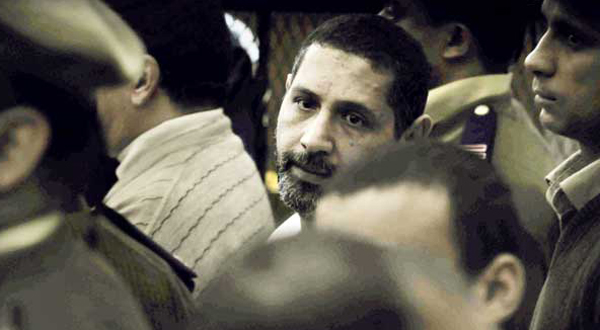 CAIRO: The State Security Criminal Emergency Court in Qena on Sunday sentenced to death one of the men found responsible for shooting and killing six Coptic Christians and one Muslim outside a church in Naga Hammadi on Christmas Eve last year.
CAIRO: The State Security Criminal Emergency Court in Qena on Sunday sentenced to death one of the men found responsible for shooting and killing six Coptic Christians and one Muslim outside a church in Naga Hammadi on Christmas Eve last year.
The court referred the case of Mohamed Ahmed Mohamed Hassan, also known as Hammam El-Kamouny, to the Grand Mufti to ratify his execution in a customary procedure.
El-Kamouny was charged — along with two other men — of killing six Copts and one Muslim, as well as injuring nine others during a drive-by shooting that followed the 2010 Coptic Christmas Eve celebrations on Jan. 6 in front of the Naga Hammadi Archbishopric.
The trial for the other two defendants — Korashi Abol-Haggag Mohamed and Hendawy Mohamed Sayed Hassan — was adjourned to Feb. 20 for the final ruling.
Legal sources expect that the two defendants will each be sentenced to life imprisonment.
Lawyer for the Orthodox Church Ramsis El-Naggar told Daily News Egypt that the court should have ordered the execution of the second defendant as well.
“The law dictates that an accomplice in a crime gets the same punishment [as] the first defendant,” El-Naggar stated.
El-Naggar described the verdict as a form of deterrence that befits the viciousness of the crime.
Tight security measures were taken inside the courtroom due to an intense media presence, with families of the victims chanting “Long live justice” immediately following the announcement of the court’s verdict.
The case was referred to court on Feb. 13, 2010, but hearings for the case were repeatedly adjourned throughout the year, stirring anger within Egypt’s Coptic community.
The ruling was met with applause by Copts frustrated with escalating sectarian tension — especially after the New Year’s Eve bombing that left 23 dead and more than 90 injured outside Al-Qeddesine (The Church of the Two Saints) in Alexandria.
Lawyer for the Egyptian Initiative for Personal Rights Ishaaq Ibrahim told Daily News Egypt that the court maintained a high level of integrity, despite his personal objection to the trial of civilians in front of special courts, such as state security or military courts.
“The court gave [all sides] the chance ... to present evidence throughout the entire year,” Ibrahim stated.



